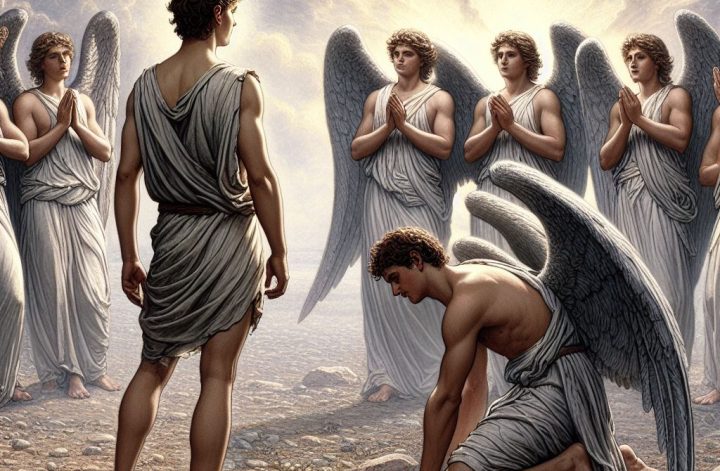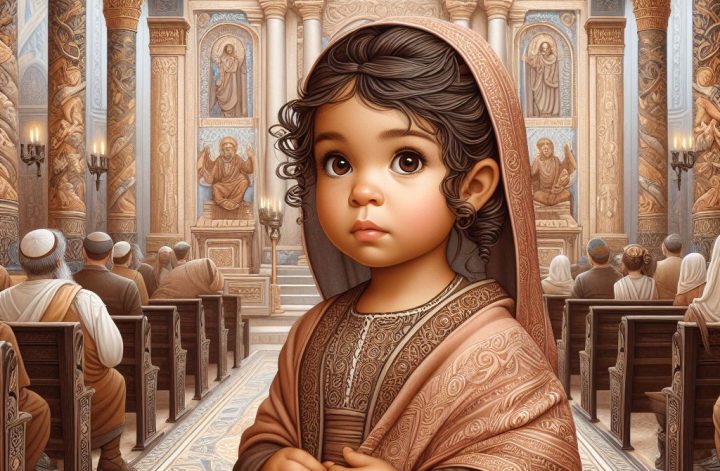Page 2 of the Bible recounts the story of Adam’s creation. Of all the details given, nothing is said about how angels felt about the creation of humans. In fact, if one does not have other later biblical information to go by, one wouldn’t even know that angels existed. The Quran, on the other hand, has much to say about how angels felt about God’s intent to create humans. All of them, at first, were opposed to the creation of humans. But after Adam demonstrated his superior knowledge, many angels changed their minds. Satan, however, never accepted the idea. In fact, the Quran teaches that Satan was cast away from heaven because he would not accept God’s sovereign choice to create humans.
Here is Quran 2:30-33 on Adam displaying his superior knowledge:
Surah Al-Baqara, Verse 30:
وَإِذْ قَالَ رَبُّكَ لِلْمَلَائِكَةِ إِنِّي جَاعِلٌ فِي الْأَرْضِ خَلِيفَةً قَالُوا أَتَجْعَلُ فِيهَا مَن يُفْسِدُ فِيهَا وَيَسْفِكُ الدِّمَاءَ وَنَحْنُ نُسَبِّحُ بِحَمْدِكَ وَنُقَدِّسُ لَكَ قَالَ إِنِّي أَعْلَمُ مَا لَا تَعْلَمُونَ
And when your Lord said to the angels, I am going to place in the earth a khalif, they said: What! Wilt Thou place in it such as shall make mischief in it and shed blood, and we celebrate Thy praise and extol Thy holiness? He said: Surely I know what you do not know.
Surah Al-Baqara, Verse 31:
وَعَلَّمَ آدَمَ الْأَسْمَاءَ كُلَّهَا ثُمَّ عَرَضَهُمْ عَلَى الْمَلَائِكَةِ فَقَالَ أَنبِئُونِي بِأَسْمَاءِ هَٰؤُلَاءِ إِن كُنتُمْ صَادِقِينَ
And He taught Adam all the names, then presented them to the angels; then He said: Tell me the names of those if you are right.
Surah Al-Baqara, Verse 32:
قَالُوا سُبْحَانَكَ لَا عِلْمَ لَنَا إِلَّا مَا عَلَّمْتَنَا إِنَّكَ أَنتَ الْعَلِيمُ الْحَكِيمُ
They said: Glory be to Thee! We have no knowledge but that which Thou hast taught us; surely Thou art the Knowing, the Wise.
Surah Al-Baqara, Verse 33:
قَالَ يَا آدَمُ أَنبِئْهُم بِأَسْمَائِهِمْ فَلَمَّا أَنبَأَهُم بِأَسْمَائِهِمْ قَالَ أَلَمْ أَقُل لَّكُمْ إِنِّي أَعْلَمُ غَيْبَ السَّمَاوَاتِ وَالْأَرْضِ وَأَعْلَمُ مَا تُبْدُونَ وَمَا كُنتُمْ تَكْتُمُونَ
He said: O Adam! Inform them of their names. Then when he had informed them of their names, He said: Did I not say to you that I surely know what is ghaib in the heavens and the earth and (that) I know what you manifest and what you hide?
In the Bible, there is no mention of God teaching Adam the names of the animals. Indeed, the account reads like Adam had complete control over what he named the animals. Whatever Adam called each animal was its name.
A source predating this Quranic story is a midrash. A midrash is a Judaic commentary on the Hebrew Bible. It takes a peculiar form usually involving a reimagining of narratives, expressed in new narratives, to accompany the main biblical ones. It also normally lists the names of Rabbis providing commentaries. The Midrash Rabbah is dated to 5th century. Here is Genesis Rabah 17:5:
Rabbi Aḥa said: When the Holy One blessed be He came to create man, He consulted with the ministering angels. He said to them: “Let us make man” (Genesis 1:26). They said to Him: ‘This man, what is his nature?’ He said to them: ‘His wisdom is greater than yours.’ He brought the animals, the beasts, and the birds before them and said to them: ‘What is its name of this one?’ And they did not know. He passed them before Adam and said to him: ‘What is the name of this one?’ He said: ‘This is an ox; this is a donkey; this is a horse; this is a camel.’
Remember, this is merely a Rabbi’s imaginative take on the creation story. It is influential but not Scripture. Also, this commentary is some 200 years older than the Quran.
Quran 2 continues:
Surah Al-Baqara, Verse 34:
وَإِذْ قُلْنَا لِلْمَلَائِكَةِ اسْجُدُوا لِآدَمَ فَسَجَدُوا إِلَّا إِبْلِيسَ أَبَىٰ وَاسْتَكْبَرَ وَكَانَ مِنَ الْكَافِرِينَ
And when We said to the angels: Make obeisance to Adam they did obeisance, but Iblis (did it not). He refused and he was proud, and he was one of the unbelievers.
The idea that Satan/Iblis would not accept humans like other angels did is later further developed in other passages of the Quran. For reasons of space, I will not quote them all. But the idea can be found in 7:11-18, 15:28-35, 17:62, 38:71-85. To cite just one of these passages, consider 7:11-18,
Surah Al-Araf, Verse 11:
وَلَقَدْ خَلَقْنَاكُمْ ثُمَّ صَوَّرْنَاكُمْ ثُمَّ قُلْنَا لِلْمَلَائِكَةِ اسْجُدُوا لِآدَمَ فَسَجَدُوا إِلَّا إِبْلِيسَ لَمْ يَكُن مِّنَ السَّاجِدِينَ
And certainly We created you, then We fashioned you, then We said to the angels: Prostrate to Adam. So they did prostrate except Iblis; he was not of those who prostrated.
Surah Al-Araf, Verse 12:
قَالَ مَا مَنَعَكَ أَلَّا تَسْجُدَ إِذْ أَمَرْتُكَ قَالَ أَنَا خَيْرٌ مِّنْهُ خَلَقْتَنِي مِن نَّارٍ وَخَلَقْتَهُ مِن طِينٍ
He said: What hindered you so that you did not prostrate when I commanded you? He said: I am better than he: Thou hast created me of fire, while him Thou didst create of dust.
Surah Al-Araf, Verse 13:
قَالَ فَاهْبِطْ مِنْهَا فَمَا يَكُونُ لَكَ أَن تَتَكَبَّرَ فِيهَا فَاخْرُجْ إِنَّكَ مِنَ الصَّاغِرِينَ
He said: Then get forth from this (state), for it does not befit you to behave proudly therein. Go forth, therefore, surely you are of the abject ones.
Surah Al-Araf, Verse 14:
قَالَ أَنظِرْنِي إِلَىٰ يَوْمِ يُبْعَثُونَ
He said: Respite me until the day when they are raised up.
Surah Al-Araf, Verse 15:
قَالَ إِنَّكَ مِنَ الْمُنظَرِينَ
He said: Surely you are of the respited ones.
Surah Al-Araf, Verse 16:
قَالَ فَبِمَا أَغْوَيْتَنِي لَأَقْعُدَنَّ لَهُمْ صِرَاطَكَ الْمُسْتَقِيمَ
He said: As Thou hast caused me to remain disappointed I will certainly lie in wait for them in Thy straight path.
Surah Al-Araf, Verse 17:
ثُمَّ لَآتِيَنَّهُم مِّن بَيْنِ أَيْدِيهِمْ وَمِنْ خَلْفِهِمْ وَعَنْ أَيْمَانِهِمْ وَعَن شَمَائِلِهِمْ وَلَا تَجِدُ أَكْثَرَهُمْ شَاكِرِينَ
Then I will certainly come to them from before them and from behind them, and from their right-hand side and from their left-hand side; and Thou shalt not find most of them thankful.
Surah Al-Araf, Verse 18:
قَالَ اخْرُجْ مِنْهَا مَذْءُومًا مَّدْحُورًا لَّمَن تَبِعَكَ مِنْهُمْ لَأَمْلَأَنَّ جَهَنَّمَ مِنكُمْ أَجْمَعِينَ
He said: Get out of this (state), despised, driven away; whoever of them will follow you, I will certainly fill hell with you all.
Life of Adam and Eve, better known as the Apocalypse of Moses, is an Apocryphal work variously dated from first to fourth century. It is originally a Jewish work, but there are many versions of it. Here are paragraphs 11 to 17, from. R. H. Charles’ 1913 translation:
XI
And when she heard this, Eve understood that (it was) the devil (who) had persuaded her to go out of the river; and she fell on her face on the earth and her sorrow and groaning and wailing was redoubled. And she cried out and said: ‘Woe unto thee, thou devil. Why dost thou attack us for no cause? What hast thou to do with us? What have we done to thee? for thou pursuest us with craft? Or why doth thy malice assail us? Have we taken away thy glory and caused thee to be without honour? Why dost thou harry us, thou enemy (and persecute us) to the death in wickedness and envy?’
XII
And with a heavy sigh, the devil spake: ‘O Adam! all my hostility, envy, and sorrow is for thee, since it is for thee that I have been expelled from my glory, which I possessed in the heavens in the midst of the angels and for thee was I cast out in the earth.’ Adam answered, ‘What dost thou tell me? What have I done to thee or what is my fault against thee? Seeing that thou hast received no harm or injury from us, why dost thou pursue us?’
XIII
The devil replied, ‘Adam, what dost thou tell me? It is for thy sake that I have been hurled from that place. When thou wast formed, I was hurled out of the presence of God and banished from the company of the angels. When God blew into thee the breath of life and thy face and likeness was made in the image of God, Michael also brought thee and made (us) worship thee in the sight of God; and God the Lord spake: Here is Adam. I have made thee in our image and likeness.’
XIV
And Michael went out and called all the angels saying: ‘Worship the image of God as the Lord God hath commanded.’ And Michael himself worshipped first; then he called me and said: ‘Worship the image of God the Lord.’ And I answered, ‘I have no (need) to worship Adam.’ And since Michael kept urging me to worship, I said to him, ‘Why dost thou urge me? I will not worship an inferior and younger being (than I). I am his senior in the Creation, before he was made was I already made. It is his duty to worship me.’
XIV
When the angels who were under me heard this, they refused to worship him. And Michael saith, ‘Worship the image of God, but if thou wilt not worship him, the Lord God will be wrath with thee.’ And I said, ‘If He be wrath with me, I will set my seat above the stars of heaven and will be like the Highest.’
XVI
And God the Lord was wrath with me and banished me and my angels from our glory; and on thy account were we expelled from our abodes into this world and hurled on the earth. And straight Away we were overcome with grief, since we had been spoiled of so great glory. And we were grieved when we saw thee in such joy and luxury. And with guile I cheated thy wife and caused thee to be expelled through her (doing) from thy joy and luxury, as I have been driven out of my glory.
XVII
When Adam heard the devil say this, he cried out and wept and spake: ‘O Lord my God, my life is in thy hands. Banish this Adversary far from me, who seeketh to destroy my soul, and give me his glory which he himself hath lost.’ And at that moment, the devil vanished before him. But Adam endured in his penance, standing for forty days (on end) in the water of Jordan.
There are actually later versions of this story that still predate the Quran (such as the Cave of Treasures, a 6th-century work), which include Satan’s reason for not prostrating to Adam as being made from fire, as opposed to clay. Such variants align more closely with the Quran. Once again, it is worth reiterating that stories like this pick up variants over time and as they spread outside the originating geographical locations. These stories survived because people found them useful and adapted them to their needs.
We are now ready for Part 4.
Work Cited
Life of Adam and Eve in The Apoccrypha and Pseudepigrapha of the Old Testament trans. R. H. Charles, Oxford, 1913.





1 Comment